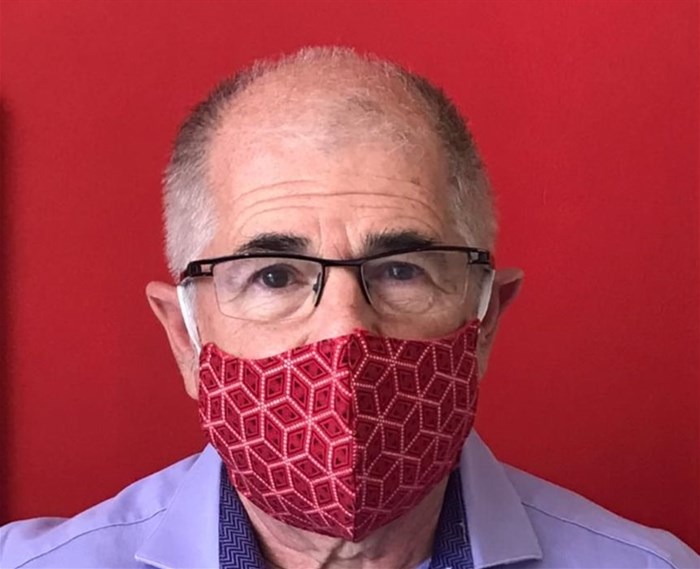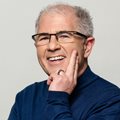#BehindtheMask: John Perlman, host of Afternoon Drive on 702

Your one-year anniversary at 702 will be soon - what has the last year been like?
Stunning. I have had a wonderful career, but in over two decades of radio, I have never felt so fully able to share with listeners who I am and what I’ve learned. That’s partly due to the format of the show which demands coverage of a wide range of topics and ideas – politics and economics of course, but also sport, music and more. And it’s also a reflection of the rich mix of listeners that is unique to 702.
WINNER - Afternoon Drive Presenter Commercial – Congrats to JOHN PERLMAN from RADIO 702 #SARadioAwards @Radio702 pic.twitter.com/gr9o9PhmQL
— @SARadioAwards (@SARadioAwards) July 30, 2021
 What’s really behind your mask - literally and figuratively speaking?
What’s really behind your mask - literally and figuratively speaking?Literally: A face with lines earned from a life well-lived. Always clean-shaven.
Figuratively: Not much. I think that what people hear on air is pretty much who I am. I don’t think I have ever cultivated or created a radio personality different to my essential self.
Growing up, what did you want to be?
Depends on how you define the outer limits of growing up. I didn’t have specific dreams as a small boy apart from the stubborn but entirely unrealistic fantasy that I might be a football star. What I do remember, though, is commentating incessantly whenever I was playing any kind of sport. And talking all the time – John talks too much was a regular comment on my school reports. So perhaps something was taking shape early on.
How did you end up working in radio?
I started in print and loved that, then dipped my toe into radio – first as a football reporter at the 1990 World Cup, then doing some talk shows on 702 as a stand-in. It took a while to get my first show but 23 years later I can’t imagine doing anything else.
What excites you most about your career?
I love the immediacy of radio, the way it feels like the listeners are right there with you in the room.
Talk radio allows you to immediately test the plans and promises of the powerful against the collective wisdom and scepticism of hundreds of thousands of people.So, after you’ve heard from the politicians and the experts, you can then set what they’ve promised or said against the questions and personal truths of ordinary people. And that engagement sets you on the road to a much richer truth – and helps you formulate new questions, clearer and better.
Why is talk radio important?
Never in South Africa’s history has it been so crucial for us to be clear in understanding our problems, focused in our soul-searching and robustly critical of the solutions that are put forward. That’s why, on every issue, we directly engage the people in power and interrogate their answers and explanations. And then we draw on our listeners to ask questions and offer solutions and we learn as their specific truths shed light on essential parts of the bigger picture.
This is consistently entertaining, but it is not entertainment. It is the highly effective process we use to scrutinize, stretch and improve the answers that the powerful offer to our pressing problems. No other media platform can do that with the speed, agility and vividness of talk radio.
What has been the highlight of your career?
On one level it would be covering South Africa’s first democratic election. But on a more profound level, it would simply be today’s show. And then tomorrow’s. Every three hours on 702 throws up moments of magic that nobody will remember for too long – not even me. But what makes each one a highlight is knowing that the next show always carries the promise of more of the same. Each of those moments reminds me of how blessed I am to host this long-running ever-surprising conversation with people who are both complete strangers and wonderfully familiar.
Where are you based during lockdown?
Mostly in my lovely sunny Joburg flat with my wife Helena and our two cats Gaia and Zoom. But I do love driving to the studio each day through the city where I was born and whose landscape still inspires me. I also take regular trips into the Kruger Park and make occasional visits to the Cape.
When you're not busy working, what do you do? How do you socialise these days?
I do gym – on a video call with my trainer – and I cycle. I collect red wine and drink it. We spend lots of time cooking and very occasionally invite two or three friends to sit outside and eat with us. I read and listen to books and watch sport on TV – which I used to think was a matter of life and death. Thanks to Covid, I now realise that the only thing that is a matter of life and death, is life and death.
What's the one thing about you that not many people know, but should?
I still, very occasionally it’s true, get scared on air.
What's your favourite meme/gif of all time?
I don’t meme to be difficult but I can’t gif a definite answer to that.
Do you have a theme song for 2021?
Nina Simone wrote a wonderful song called Ooh Child. The lyrics are simple and strong:
O-o-h child things are gonna get easierDoesn’t sound like much but just wait until you hear it.
O-o-h child things'll get brighter
Someday we'll get it together and we'll get it undone
Someday when the world is much brighter
Someday we'll walk in the rays of a beautiful sun
Someday when the world is much lighter
Are you watching any series? Reading any books at the moment?
I’m between series right now. Best this year: The Queen’s Gambit. Best ever: The Wire.
I always have one book in hard copy and one audiobook on the go, usually one fiction and one non-fiction.
Currently: The Song Book of Benny Lament by Amy Harmon and Empire of Pain: The Secret History of the Sackler Dynasty by Patrick Radden Keefe. Both brilliant.
What's next for you?
Today’s show.










